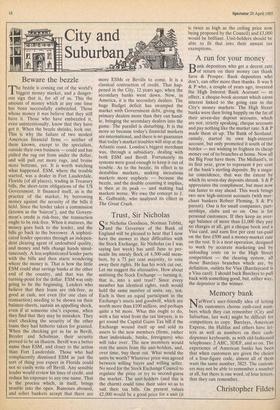A run for your money
Bdepositors who get a decent rate J-.) of return on their money can thank Save & Prosper. Bank depositors who *don't, can offer more than thanks. It was S & P who, a couple of years ago, invented the High Interest Bank Account — in effect, a cheque-book account which earns Interest linked to the going rate in the City's money markets. The High Street banks were then living happily on the fat of their seven-day deposit accounts, which are not, strictly speaking, cheque accounts and pay nothing like the market rate. S & P made them sit up. The Bank of Scotland, cannily, started its own high-interest account, but only promoted it south of the border — not wishing to frighten its cheap money out of its branches at home. Now all the Big Four have them. The Midland's, in its first year, grew to represent 4 per cent of the bank's sterling deposits. By a singu- lar coincidence, that was the extent by which its seven-day deposits shrunk. S & P appreciates the compliment, but must now run faster to stay ahead. This week brings two new high-interest accounts (with mer- chant bankers Robert Fleming, S & P's ,parent). One is for small companies, part- nerships, clubs and so on. One is for personal customers. If they keep an aver- age balance of more than £1,000 they pay no charges at all, get a cheque book and a Visa card, and earn five per cent tax-paid on the first £500 and a money-market rate on the rest. It is a neat operation, designed to work by accurate marketing and by unloading costs on to the High Street competition — the clearing system, all those Barclays branches which are, by definition, outlets for Visa (Barclaycard is a Visa card). I should back Barclays to pull back with something good, but, either way, the depositor is the winner.














































 Previous page
Previous page